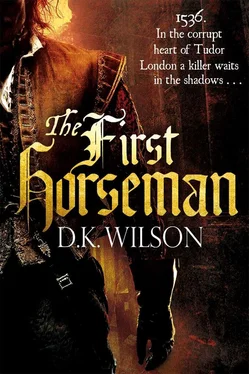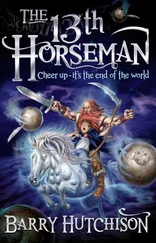D. Wilson - The First Horseman
Здесь есть возможность читать онлайн «D. Wilson - The First Horseman» весь текст электронной книги совершенно бесплатно (целиком полную версию без сокращений). В некоторых случаях можно слушать аудио, скачать через торрент в формате fb2 и присутствует краткое содержание. Год выпуска: 2013, ISBN: 2013, Издательство: Little, Brown Book Group, Жанр: Исторический детектив, на английском языке. Описание произведения, (предисловие) а так же отзывы посетителей доступны на портале библиотеки ЛибКат.
- Название:The First Horseman
- Автор:
- Издательство:Little, Brown Book Group
- Жанр:
- Год:2013
- ISBN:9781405518871
- Рейтинг книги:5 / 5. Голосов: 1
-
Избранное:Добавить в избранное
- Отзывы:
-
Ваша оценка:
- 100
- 1
- 2
- 3
- 4
- 5
The First Horseman: краткое содержание, описание и аннотация
Предлагаем к чтению аннотацию, описание, краткое содержание или предисловие (зависит от того, что написал сам автор книги «The First Horseman»). Если вы не нашли необходимую информацию о книге — напишите в комментариях, мы постараемся отыскать её.
The First Horseman — читать онлайн бесплатно полную книгу (весь текст) целиком
Ниже представлен текст книги, разбитый по страницам. Система сохранения места последней прочитанной страницы, позволяет с удобством читать онлайн бесплатно книгу «The First Horseman», без необходимости каждый раз заново искать на чём Вы остановились. Поставьте закладку, и сможете в любой момент перейти на страницу, на которой закончили чтение.
Интервал:
Закладка:
‘What did he say?’
‘The archbishop?’
‘No, the archbishop’s gentleman.’
‘Oh, him. Well, that was funny. “The king has invited the ass to come down from the North,” he said. Now what he meant by it, I can’t think. Some sort of a court jest, I suppose. Can you think who the “ass” might be? They do have some funny ways, these court folk. I remember Queen Catherine’s silk woman. She stayed here. Spanish she was, though her English was good enough. Insisted that I sat here and tasted all her food in front of her before she would put a morsel in her mouth. She thought that I would poison her! There’s many folk would have been right put out by that. I just laughed at her funny ways. Of course, there’s some as you can’t laugh at. When one of the Duke of Norfolk’s men was staying here, the duke himself came to visit him, along with the Bishop of Winchester. Can’t say I ever liked the looks of him. Sat round this very table, they did, talking till nigh midnight — and no one allowed to come near them. Soldiers on the doors. What they were hatching only our Dear Lady knows. Not treason, I hope — not under my roof.’
It was late before I was able to disengage myself from Mistress Flower and go thankfully to my bed.
Flurries of snow slowed my progress the following day and it was gone noon before I reached the City. My first sight of the river above the bridge revealed islands of ice packing up against the stone piers and beginning to spread eastwards. Several lads had gathered at the bank and were testing the ice, daring each other to venture further and further out. I was glad to reach my own workshop where the refining furnace emitted a welcome heat and where a healthy fire blazed in my own chamber. There was, as yet, no message from Cromwell but, inevitably, there were many other matters that had accumulated in my absence and I was soon absorbed in writing letters, supervising the ongoing work and dealing with requests for new commissions. And I was enjoying it. It may not have been until months later that I reflected on the effects that recent events had had on me but I then came to see that, by the Christmas of that terrible year, 1536, I wanted nothing other than to be allowed to be no more and no less than Master Thomas Treviot, goldsmith of Cheapside in the City of London.
That was not to be — not yet. Late that afternoon I received an unusual visitor. The young woman who asked for me by name arrived unattended but was certainly not a servant bearing a message from a noble mistress. Equally clearly, she was not a lady of means, come to order a piece of gem-set jewellery. She was a slight creature of seventeen or eighteen, wearing a russet woollen overgown, which can have been scarcely adequate on such a freezing day. The auburn hair tucked into her linen coif paid no obeisance to prevailing fashion. The frost had pinched her cheeks to a high colour and the eyes that looked at me pleadingly were soft and brown — kindly, I thought, rather like those of a young foal. She had refused to disclose her business to my assistant and when told that I was very busy, she declared that she would wait. I went through into the shop with the intention of dealing with the woman quickly and getting on with more important matters. My assumption was that she had come on the embarrassing errand of seeking to pawn some precious object for much-needed cash. This was dispelled as soon as she curtsied and introduced herself.
‘I greet you well, Master Treviot. My name is Sarah Walling, wife to Benjamin Walling.’
I hope I covered my surprise. ‘Then, you are welcome, Mistress Walling. Your husband has been a good friend to me,’ I said, leading her to the parlour.
When we were seated before the fire, I asked, ‘Is Ben well? Is he not able to come with you?’ I was suddenly anxious for the young man. I had strongly counselled him to quit the capital in case my enemies decided to pursue him. Could it be that he had ignored that advice and was now languishing in some damp cell awaiting interrogation by the bishop’s officers?
‘Thank you, Master Treviot,’ Sarah replied. ‘Ben is in good health.’ She lowered her head. ‘I fear it is shame that keeps him from your company.’
I was puzzled. ‘Shame? I can think of nothing that he could possibly reproach himself for.’
‘Then, by your leave, I must explain. Ben and I have been in love for more than three years. My father was furious when he found out. He made life very difficult for Ben but Ben stood up to him and told him that we wanted to be married. No daughter of his, my father said, was going to marry a penniless apprentice. They had a terrible argument and my father threw Ben out. The poor lamb was reduced to begging for work — any work. Ben is strong and clever and diligent and honest. If he can only get a start in life, he will be very successful. He got occasional labouring jobs and saved whatever he could so that, one day, he could make me his wife. And I promised to wait. But my father was very determined. He arranged what he called a “suitable” match. If Ben and I were ever to be together we had to act quickly. That was when Ben met you. He was standing by the Standard in Cheap, hoping to be hired as a day labourer, when your friend was so horribly murdered. When you paid him to make some enquiries, well…’ She hesitated. ‘That seemed to be our chance. I escaped from the house and Ben gave the last of your money to an old priest, who married us. That was four weeks ago.’ She sighed a long, shuddering sigh. ‘I brought a few trinkets with me but they are gone — sold or pawned. And now we have nothing. I said to Ben, “Perhaps, you might turn to your friend Master Treviot for help”, but he would not hear of it. “Master Treviot has his own problems,” he said, “and I have not been wholly honest with him. I cannot face him.” So I have come in my husband’s stead to plead with you. He doesn’t know I have come. I feel as though I am betraying him — but we are desperate.’
‘You must tell Ben to have more faith in his friends,’ I said in what I hoped was a reassuring tone. ‘If he comes to see me I will certainly see if there’s anything I can do…’
‘You have you not heard all.’ Sarah stared mournfully into the heart of the fire. ‘We have a room in a tenement in Love Lane, off Coleman Street. ’Tis small enough, God knows, but now we must share it with a great friend of Ben’s, newly returned from the North.’
‘Would that be a young man by the name of Bart?’
Sarah nodded. ‘Aye, Bart Miller. Do you know him?’
‘We have met briefly. I understand he went back to his own country to join the rebels.’
‘Yes, beef-witted fool! Now he is here again, minus an arm and lucky still to have his head, from what he tells us.’
‘And he is staying with you?’
‘Aye, when his “great cause” collapsed he ran back to London to cast himself on his old friend, who is already at wit’s end to know how to support a wife. Ben’s trouble is that he is too soft-hearted — or, perhaps, it would be truer to say “soft-headed”.’
‘I can see it must be a great strain for you.’
Sarah nodded. ‘Now you know all our troubles. Can you do anything to help?’
‘Well,’ I said, ‘the least I can do is fill your bellies. Bring Ben and Bart here this evening and we’ll talk about things over supper.’ I recalled what Ned had said about the people for whom I was responsible. It seemed that the list was longer than I had thought — and still growing.
The next arrival that day was altogether more welcome. William Locke’s head groom appeared, bringing with him a sprightly looking Dickon, now fully recovered from his injury. We welcomed each other warmly and the grey whinnied with pleasure when he was led into his old stall. Was this an omen that the bad times were behind us both? I dared to hope that it was.
Читать дальшеИнтервал:
Закладка:
Похожие книги на «The First Horseman»
Представляем Вашему вниманию похожие книги на «The First Horseman» списком для выбора. Мы отобрали схожую по названию и смыслу литературу в надежде предоставить читателям больше вариантов отыскать новые, интересные, ещё непрочитанные произведения.
Обсуждение, отзывы о книге «The First Horseman» и просто собственные мнения читателей. Оставьте ваши комментарии, напишите, что Вы думаете о произведении, его смысле или главных героях. Укажите что конкретно понравилось, а что нет, и почему Вы так считаете.












